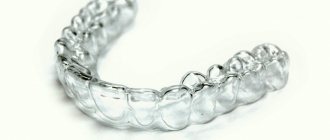Dental implantation is a responsible operation, the recovery period after which is associated with the use of medications. For this reason, implantation during pregnancy is contraindicated. In addition, hormonal changes during pregnancy weaken the body, which has to adapt to new working conditions.
Dental problems often appear during pregnancy. Hormonal changes in the body also negatively affect dental health. A woman should definitely undergo a medical examination.
Dental implantation is prohibited for pregnant women, even if it is necessary to restore 1 or 2 teeth.
Removable prosthetics with complete edentia are also prohibited. Pregnancy should be planned after implantation.
Main dental problems and what causes them
According to statistics, during pregnancy, 30% of women have problems with their gums (gingivitis, periodontitis) and 90% with their teeth (caries, pulpitis), and 80% have increased sensitivity of the enamel and a weakening of its mineralization (susceptibility to chipping). The reasons for this are hormonal changes in the body and changes in metabolism.
After all, not only does the baby “take” useful macro- and microelements, the body is also preparing for childbirth, so the bones soften (including the jaw bone, but very little). Also, against the background of all the mentioned processes, problems with immunity may arise - both general and local in the oral cavity. Therefore, the body is susceptible to various infections, which must be eliminated so as not to complicate the course of pregnancy - but, at the same time, not to harm the child.
Good to know! It is very dangerous to underestimate gum inflammation, because... untreated gingivitis (manifested by bleeding and swelling of the mucous membranes) develops into periodontitis - this is inflammation that covers the deep areas of the gums and the bone around the roots. And periodontitis increases the risk of pregnancy complications 8 times - miscarriage, preeclampsia, premature birth and low birth weight of the child.
Is it possible for pregnant women to have microprostheses installed?
Let's talk about whether microprosthetics of teeth can be done during pregnancy.
If you really want to transform your smile with the help of veneers or lumineers, then in general there are no absolute contraindications to this procedure, especially if the woman feels well and the pregnancy is easy. After all, installing onlays on the front part of the teeth in most cases does not involve significant intervention, surgical manipulations, anesthesia, does not require radiography and strong grinding of the enamel - all that can disturb the emotional background of a woman and negatively affect the fetus. But most dentists will still prefer to postpone the procedure until after the baby is born.
“According to statistics, every third pregnant woman is diagnosed with a disease such as gingivitis. Simply put, this is inflammation of the gums and their swelling, increased bleeding. Moreover, in most of them, in 79% of all cases, also against the background of hormonal changes, the enamel becomes very fragile and sensitive. And 90% are diagnosed with caries, which requires treatment. And all these are indicators of women with a normal pregnancy. It is simply not possible to carry out even microprosthetics in such conditions with high quality and without health consequences,” adds Vasin Yu.A., orthopedic dentist.
Contraindications to medications and examinations
The first thing that is not recommended for pregnant women is an X-ray examination, be it a regular targeted X-ray or a computed tomography scan, because harm to the fetus may outweigh the benefit to the mother. The fact is that even when treating pulpitis, you need to take at least 2 pictures; during prosthetics and implantation, you also need to undergo x-ray diagnostics several times. As for toothache tablets, you can take them only after consulting a doctor, because Some drugs sharply lower blood pressure.
The use of antibacterial drugs, which are prescribed after tooth extraction and implantation, when treating gums, can be dangerous for the baby. Moreover, in a number of situations the patient needs to take several antibiotics at once, affecting different forms of bacteria. And doctors prescribe such drugs strictly according to indications - independent use is prohibited. By the way, cephalosporin antibiotics (cefazolin, for example) are considered the most “harmless” during pregnancy. Also, during treatment and prosthetics during pregnancy (and not only) there are contraindications for anesthesia - a regular “freezing” injection, sedation or anesthesia (we will discuss this in more detail later).
PROSTHETICS WITH 6 OSSTEM IMPLANTS FROM RUB 200,000.
Complex implantation Osstem (South Korea) with delayed loading after 4-6 months.
Call now or request a call
What to do if the implant is already installed
Such situations also occur: you find out about pregnancy at the most active moment of osseointegration, i.e. implant engraftment in the jaw bone tissue. Naturally, the job has already been done, so the main thing that is required of you is to follow a few rules.
Rule No. 1: notify the implantologist and gynecologist
From now on, all your actions must be coordinated with these doctors. Also, truthful and timely information will help specialists adjust the treatment schedule and prescribe the safest medications for you, and strengthen control over your health.
The safest analgesics during pregnancy are No-shpa, Papaverine, Paracetamol, and Ibuprofen. Among antibiotics, cephalosporins pose the least risk to the mother and fetus, but tetracycline and doxycycline drugs are contraindicated due to toxicity and the effect on the baby’s tooth buds and bone structure.
Rule #2: Calm down
There is no need for unnecessary worry now, especially since you have already completed the preparation for implantation, including treatment of teeth and gums, oral sanitation, professional hygiene and installation of the implant itself, which means that part of the important stage is left behind. You should also be pleased with a positive thought: if conception occurred during the period of osseointegration of the artificial root, it means that the bone tissue is healing well, and the mother of the unborn baby can boast of good health.
Rule #3: Strengthen your oral hygiene
Pregnancy is often accompanied by such unpleasant phenomena as increased sensitivity of the gums and the development of an inflammatory process in the mucous membrane. A woman’s situation can be complicated by gingivitis and periodontitis, which is a threat to the successful implantation. Therefore, after each snack, rinse your mouth with water or mouthwash, purchase a floss and irrigator, and fill your diet with foods useful for improving blood circulation in the gums. Also, do not skip any hygienic brushing of your teeth and change your toothbrush more often (once a month) so that bacteria do not have time to accumulate on it.
Rule #4: Start taking vitamins
For high-quality osseointegration, the condition of all body systems is very important - vitamins such as C and B are needed, as well as microelements - calcium, phosphorus, fluorine. Consult with your attending physicians (both an implantologist and a gynecologist) regarding the introduction of vitamins. It is important to do this harmoniously and at the right time so as not to harm the baby.
Dental implantation using the Osstem system = 70,000 rubles.
All inclusive, treatment guaranteed!
Premium implants at an affordable price. Free consultation with an implantologist +7 (495) 215-52-31 or write to us
What help can a dentist provide?
The peculiarities of treatment and prosthetics during pregnancy include the fact that all procedures are carried out using gentle methods. The doctor must always correctly assess the overall picture, because the benefits of treatment must outweigh the expected harm. According to the indications - if the pain is very strong, there are signs of negative dynamics of non-invasive treatment (from minor interventions), then a pregnant woman can have pulpitis cured and the tooth removed - even a complex extraction. But these are all emergency situations. Basically, the dentist offers the following treatment:
- elimination of initial and intermediate caries,
- installation of fillings made of photopolymers,
- restoration of gum health with hypoallergenic drugs that do not penetrate the bloodstream and do not harm the fetus,
- removal of tartar and bacterial plaque,
- professional teeth cleaning,
- remineralization: strengthening the enamel with useful minerals - calcium, fluorine, phosphorus,
- vitamin therapy: vitamins B, C, PP are useful for oral health - but the prescription of any drugs is carried out with the participation of a gynecologist,
- some types of prosthetics: we’ll talk about this later.
Nuances of treatment and prosthetics in pregnant women
Dentists recommend doing oral sanitation, i.e. elimination of all dental diseases, even at the stage of pregnancy planning. But if this condition occurs unexpectedly in a woman’s life, then it’s worth knowing when it’s best to see a dentist:
- in the first trimester - up to 12-13 weeks: the fetus develops all the vital organs, and the woman often feels unwell (weakness, dizziness, nausea). Therefore, dental intervention is necessary only for really serious indications - which include toothache, bleeding gums,
- in the second trimester - 14-26 weeks: the most suitable period for the treatment of caries (even if there is no pain, but there is a carious cavity), professional hygiene and, if necessary, prosthetics. Because the main “laying in” of the child’s organs has already occurred, and the well-being of the expectant mother has improved,
- in the third trimester - after the 27th week and before childbirth: here, in addition to noticeable changes in the figure, which creates inconvenience during a long stay in the dental chair, pregnant women often experience hypertension and increased blood glucose levels. Therefore, it is better to postpone planned dental treatment until the postpartum period, but in emergency cases it is better not to postpone a visit to the dentist.
After childbirth, dental treatment and prosthetics may also have contraindications due to the fact that the child is breastfed - and various drugs can pass into milk. And do not forget that calcium enters milk from the mother’s body, so the bones of the woman herself at this time are not yet strong enough. Therefore, it is also recommended to postpone planned treatment until 3-4 months after completion of lactation.
Is it possible to combine dental implants and pregnancy?
- During pregnancy, the immune system is weakened, so it takes longer to recover, and infections develop quickly.
- Any surgical intervention is stressful for the body and is strictly contraindicated for pregnant women.
- The preparatory stage includes a mandatory x-ray examination, which is undesirable for the unborn baby.
- Pregnant women should not be given anesthesia or take anti-inflammatory drugs.
- Treatment of possible complications after implantation will also require medication.
- If surgery is already planned and the woman finds out she is pregnant, the surgery should be cancelled.
Implantation in the first trimester of pregnancy is dangerous. All vital organs are formed in a woman’s body, and the operation will not only negatively affect this process, but can provoke an interruption.
Immediately after childbirth, implantation is also undesirable, since the body needs time to recover. About a year.
Features of the use of anesthesia
Many popular anesthetic drugs contain the hormone epinephrine (adrenaline), which prolongs the effect of the anesthetic itself by constricting blood vessels and slowing blood flow at the injection site. But adrenaline also penetrates into the blood - and can provoke uterine hypertonicity, increase blood pressure, and disrupt the formation of internal organs in the fetus (if this hormone was taken before the 12th week of pregnancy).
Therefore, in the treatment and prosthetics of teeth during pregnancy, other substances are used for anesthesia. For example, “Ultracaine D” (which contains only non-toxic articaine) or “Primacaine” with articaine and a minimum concentration of epinephrine (10 mcg). Also, pregnant women can use the anesthetic "Sevoran" - but only under the supervision of an anesthesiologist-resuscitator. The effect of articaine is about 20 minutes, and in combination with epinephrine – up to 45 minutes.
After considering all the important features and limitations when providing dental treatment to pregnant women, we will tell you how prosthetics are done during pregnancy, with what dentures and according to what rules (indications and features).
What risk factors prevent implantation during pregnancy?
Pregnancy is a period of hormonal changes, when the mineralization and strength of enamel is disrupted and immunity decreases. The mother’s body practically gives everything to the future baby, who “takes” useful elements from the woman’s teeth, bone and muscle tissue. Due to hormonal imbalance in a pregnant woman, the structure of the gums changes, the mucous membrane becomes loose, the risk of getting gingivitis and any infectious disease increases, the protective functions of saliva worsen and its pH changes. Any wounds in a woman’s body during this period heal very poorly, which can ultimately lead to peri-implantitis, rejection of the structure, and difficulties and risks during the rehabilitation period.
Why else do specialists refuse implantation for pregnant women:
- it is necessary to undergo an x-ray: the radiation dose of modern tomographs and radiovisiographs is minimal, and there is also no information that x-rays have a negative effect on the fetus. However, experts insist that taking pictures of pregnant women is only possible when the potential benefit is many times greater than the possible risk. In addition, you will have to undergo radiography not once, but at least three times,
- the need to undergo additional manipulations: for example, implantation cannot be carried out without prior sanitation of the oral cavity. Those. it is necessary to cure all dental problems, remove decayed teeth, if any. Perhaps the patient has bone tissue atrophy and cannot do without its augmentation. And if it is not advisable to carry out dental treatment during pregnancy, it is allowed in the second trimester, then surgery to build bone, removal is contraindicated due to the traumatic nature, difficult rehabilitation,
- getting into a stressful situation: any person is worried, even if he understands that the procedure will be completely painless and successful. But dental implantation during pregnancy is double stress for a woman, there is no doubt about it,
When there is excitement in the body, cortisol is produced in increased quantities, and scientists have proven that the hormone also negatively affects the fetus. Babies whose mothers were nervous had an increased risk of developing diabetes and cardiovascular pathologies. Women themselves, due to the production of the hormone, risk increasing toxicosis, uterine tone, and increase the risk of miscarriage in the early stages and premature birth in the later stages.
- pain reactions: firstly, during pregnancy the pain threshold decreases, i.e. even the slightest intervention causes very severe pain, plus the woman may not be affected by anesthesia, which in itself is harmful, penetrates the placental barrier and leads to the development of abnormalities in the fetus. Secondly, without anesthetics it is impossible to carry out dental implantation and calmly go through the rehabilitation period. Thirdly, the feeling of pain again causes increased activation of adrenaline in the blood, which leads to uterine tone,
- lack of calcium in the body: it would seem that this factor only harms the baby. But in fact, it also affects the quality of implant healing and its fusion with the jaw bone tissue. If there is a lack of an element, and successful osseointegration requires a lot of it, the implant may simply not take root and will be rejected,
- risk of infection: implantation involves inserting an implant either through a puncture, through surgical guides, or through incisions. Even with the most minimally invasive intervention, a wound is formed that requires time to heal. And given that in pregnant women it will take a long time to heal, it cannot be ruled out that bacteria will penetrate there, especially against the background of weakened immunity,
- taking antibiotics and medications: often during the rehabilitation period, doctors prescribe various drugs to patients to maintain immunity for rapid recovery, healing of wounds and relieving the inflammatory process. Antibiotic therapy is contraindicated for pregnant women.
Types of dentures
Dentures can differ in the time of fixation - temporary and permanent, in the type of installation - removable and fixed, on your own teeth and on implants, as well as in size (how many teeth they replace). Orthopedic structures are also classified by material - acrylic, nylon, polyurethane, with and without metal inclusions (nickel, gold, titanium), ceramic, glass-ceramic, zirconium dioxide and others.
REPROSTHETICS WITH ACRYLIC PROSTHETICS - RUB 200,000.
Re-prosthetics with an acrylic bridge on a metal frame (all included) up to 12 units.
Save RUR 30,000. Call now or request a call
What prosthetics are allowed during pregnancy and when?
Crowns and bridges supported by your own teeth - installed in rare cases
Prosthetics with crowns and bridges are usually not performed during pregnancy. Because it is necessary to prepare the supporting teeth - grind, remove nerves, install a retraction thread under the gum, take impressions of the dentition. It may also be necessary to remove decaying teeth or roots. Of course, some of these manipulations are carried out with anesthesia and evaluation of the intervention performed using x-rays.
Temporary crowns or adhesive bridges can be placed in almost any case where permanent dentures are required, but this is not yet possible. For example, when a tooth is destroyed by more than 50% and the installation of a conventional filling is already contraindicated, but at the same time it is necessary to preserve the remains of the tooth for subsequent permanent prosthetics (which will be done after childbirth).
Implantation – installation of implants: not carried out
Implantation is currently considered a fairly ordinary procedure with a minimum of contraindications, of course, with the participation of an experienced dentist-implantologist. But during pregnancy, no doctor will undertake it, since dental implantation is not a vital operation (and surgical interventions are performed for pregnant women only for serious reasons). During implantation, the pressure may “jump” and the woman may become worried. Again, you need to do anesthesia - local or general.
A computed tomography scan of the jaw is also necessary before implantation, and after it a panoramic image or targeted radiography is taken. And do not forget that the bone substance of the jaw does not receive calcium in a normal volume, so the implant may not achieve primary stability. And against the background of gingivitis and periodontitis in pregnant women, peri-implantitis or implant rejection may begin.
When restoring 1-2 teeth after a long absence, osteoplasty may be necessary - bone augmentation surgery, because there is not enough of its own to place the implant (it has atrophied without the load it previously received from the root). This manipulation is contraindicated for absolutely all pregnant women. Indeed, in addition to the obvious trauma and long tissue healing, the implanted bone may simply not take root, i.e. The operation was done in vain. It would be fair to add that even in non-pregnant women and men, osteoplasty is ineffective in 40% of cases - and it has to be done again.
Complex on 4 OSSTEM implants with delayed loading - 150,000 rubles.
Complex implantation Osstem (South Korea) with delayed loading after 4-6 months.
Doctor's work guarantee - up to 5 years (under an agreement on the provision of medical services) Call now or order a call
Opening hours: 24 hours a day - seven days a week
Prosthetics on implants: can be performed (according to indications)
If implants were installed before pregnancy, but prosthetics were not performed, then it is not always possible to do it at the moment. This is due to the fact that when implants are installed to replace 1-2 teeth, they are covered with gum on top and left alone for 3-6 months until complete engraftment. And in order to place abutments on the implants (support for a prosthesis, crown, bridge), the gums will have to be cut. Moreover, anesthesia is first administered, and then in a number of situations, stitches are applied and antibiotics are prescribed.
If, before pregnancy, a woman had abutments and temporary crowns (removed from the bite) or other temporary prostheses placed on implants, then there are no contraindications for the installation of permanent orthopedic structures. And if the patient feels well, they are allowed to be placed.
“I had an implant in my lower jaw, and they were supposed to put a crown, but then the test showed two stripes)) I, of course, went to my dentist. He said that I could get a crown in a couple of months if I felt okay. So after the toxicosis ended successfully, I went to get prosthetics. And there were no special problems while the crown was being installed.” Alina, review from baby.ru
Veneers and inlays: can be done
It is possible to get veneers for a pregnant woman, because... Preparation in this case is minimal - the dentist will slightly grind the enamel of the front teeth, and there is no need for anesthesia. But doctors recommend, if possible, postponing microprosthetics until the postpartum period, because In expectant mothers, tooth sensitivity increases, and grinding without anesthesia before taking impressions can be uncomfortable. Or you can install ceramic composite veneers or lumineers, for which turning is not always necessary.
Read on the topic: “Hollywood veneers” or Lumineers – what are their advantages and disadvantages.
As for restorative inlays, they can be placed provided that there is no need to first remove nerves from the teeth and fill the root canals (after all, these procedures are carried out with anesthesia and x-rays). Or carry out microprosthetics in the second trimester of pregnancy when treating pulpitis in a diseased tooth. Restorative inlays are the best replacement for a conventional filling, because... they fit more tightly to the tooth walls and last about 15 years, while a filling will last 5 years maximum.
BEST REMOVABLE DENTURE - 20,000 rub.
All manipulations for the manufacture, installation and fitting of the prosthesis, including impressions, are included.
Save RUB 10,000! >> Call now or request a call
Opening hours: 24 hours a day - seven days a week
Removable dentures: can be carried out
Removable1 dentures rest mainly on the gums – which are already swollen during pregnancy. Also, the installation of removable structures, especially long ones with massive artificial gums or palates, is associated with severe discomfort. The woman will experience more nausea and dry mouth - i.e. saliva washes the gums and teeth worse, and this leads to increased gingivitis or provokes caries. Another disadvantage is that the denture moves while chewing food. That is, increased rubbing of the gums occurs again, and it becomes necessary to attach the denture to a special cream (Protefix or Coregu, for example).
Therefore, removable dentures are not recommended for the expectant mother, even as a temporary option; it is better to replace them with temporary fixed ones. An exception is when a woman does not have a large number of teeth, for example, many sick teeth had to be removed during pregnancy or shortly before it, and implants were not placed in time. And here you should choose either lightweight Quattro Ti or hypoallergenic Acry-free. Moreover, they should be worn only under the supervision of a doctor - i.e. You will have to visit your dentist regularly to evaluate your oral health.
Don't know what type of prosthetics to choose?
We will help in the selection, advise where to read more information and compare types of prosthetics.
Consultation with an orthopedic doctor in Moscow clinics is free! Call now or request a call
Working hours: from 9:00 to 21:00 - seven days a week
Is it possible to install completely removable dentures?
It is undesirable to do this during the period of bearing a child for the reason that the gums of expectant mothers are almost always slightly swollen due to gingivitis. And removable prosthetics requires full contact of the prosthesis itself with the gum so that it stays securely in the mouth, but with a structural change in the alveolar process of the jaw, this is impossible.
On a note! The inflammatory process is dangerous not only for the expectant mother and the health of her teeth, but also for the baby. Thus, scientists claim that foci of untreated infection in 30%1 of cases lead to some kind of damage to the fetus, and children of such mothers are more often born with low immunity, they also more often have impaired gastrointestinal tract activity than babies whose mothers are pregnant had no problems. Therefore, even during pregnancy there is a reason to consult a doctor, but not for prosthetics, but for the prevention and adequate treatment of inflammation in the oral cavity, be it sore teeth or gums.
In addition, wearing removable dentures is associated with a rather long and difficult period of adaptation, during which painful sensations, severe rubbing of the mucous membrane, and a gag reflex are possible - for a pregnant woman this is a stressful and very dangerous situation, fraught with complications.
What can we say in the end? To use prosthetics or not?
Dental prosthetics during pregnancy is possible, but each case should be considered individually, since for expectant mothers there are many contraindications for certain manipulations and examinations. There are also favorable and unfavorable periods for dental treatment. However, this does not mean that if you have a toothache or problems with your gums, you need to wait until the 13th week or until childbirth. On the contrary, this is considered a direct indication for immediate contact with the dentist - the sooner the problem is eliminated, the lower the risk of complications. After all, a child needs a healthy mother.
During what periods of a woman’s life should she be careful?
The female body has physiological characteristics and functions somewhat differently than that of men. Almost every woman in her life goes through stages that have a significant impact on her health, condition, and weaken her immune system:
Dental bridge on implants = 180,000 rub.
Free consultation with an implantologist +7 (495) 215-52-31 or write to us
- “critical days” (menstruation),
- planning pregnancy or IVF,
- pregnancy,
- lactation,
- menopause.
It is these moments that are the reason for a professional doctor to carefully consider the planning of any intervention in the living tissues of the body or to refuse it altogether. And we are talking here not only about dental implantation, which is a fairly simple procedure even compared to tooth extraction. We are talking about the success of the result during the period of hormonal changes, and about safety for the woman’s health. If you are considering the possibility of dental implantation during pregnancy, you need to think about whether this process will affect the well-being of the baby.
Do not forget that implantation is not limited to the installation of titanium roots; it is accompanied by taking medications, antibiotics and anesthetics, anxiety, and undergoing X-ray examinations. But we’ll tell you about everything in order.
Patient Questions
QUESTION Good afternoon, tell me what is the best way to proceed. I had a severely broken molar on the side. It doesn't hurt, but the tongue hurts a little. Is it possible to cure it or put a crown on it? Because I heard that it’s better for pregnant women to get their teeth done in the second trimester, but I’m now in the third. Maria
ANSWER Hello, Maria. In your case, it is better not to wait until after birth. After all, then you simply may not have enough time for treatment, and delaying it can lead to complications. The question of what is best to do - file a tooth, put a filling or a temporary crown - is best decided personally with your dentist after an examination.
1Zhulev E.N. Partial removable dentures, 2011.
Author: Dzagurova E. R. (Thank you for your help in writing the article and the information provided)











